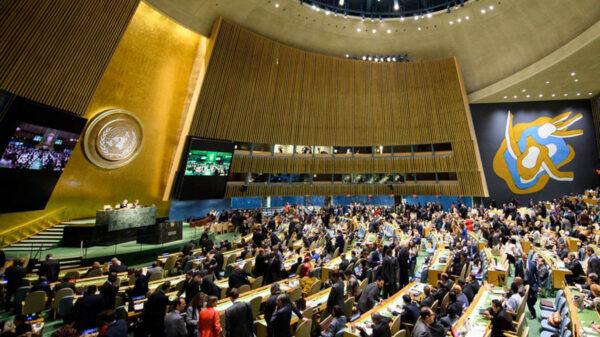On November 1, 2017, for the 26th time, a General Assembly of the United Nations voted 191 to two for a resolution condemning the United States’ Embargo against the Republic of Cuba, a member nation. Voting against the resolution were the United States and the State of Israel.
While the vote, yet again, sends a clear and resounding message of world opinion in favor of Cuba and against the decades-old Embargo, it was essentially meaningless— unenforceable by the United Nations as a representative world body.
Over the past year or so, many individuals and groups have lobbied the U.S. on social media and via public gatherings in Cuba and around the world through a campaign to end the Embargo—“No más bloqueo.” While this campaign has been highly visible and admirable, it also has been basically ineffective. The U.S. simply won’t budge in its dogmatic enforcement of unfair financial sanctions which have stalled the Cuban economy for over 60 years.
At the same time, without presenting any solid evidence, the U.S. has charged that “sonic attacks” have been directed against U.S. diplomats and allegedly some U.S. tourists visiting Cuba. While the U.S. State Department has not charged the island nation with directing those attacks, it has withdrawn the majority of its diplomats from Cuba and ordered Cuban diplomats out of the U.S. and discouraged U.S. citizens from visiting Cuba.
In both the case of the Embargo and the alleged “sonic attacks,” Cuba has clearly been wronged and has suffered nearly irreparable economic losses. More importantly, the Cuban people have suffered years of deprivation as a result.
Yet it would seem that, as a nation, Cuba has little to no recourse against the powerful United States.
Not so.
Overlooked by the Cuban government has been the International Court of Justice (ICJ), the judicial arm of the United Nations (also known as the World Court). This court, in contentious cases (adversarial proceedings seeking to settle a dispute), the ICJ produces a binding ruling between states that agree to submit to the ruling of the court.*
It is significant and at the same time perplexing that Cuba has never pleaded its case regarding the Embargo before the ICJ. Of 166 cases heard before the ICJ since 1945, not one has been presented by the Republic of Cuba.
Yet Cuba has what many would agree is a very strong case against the U.S. Embargo. For example, in 2014 the United States basically de facto ruled against itself when then-president Obama announced renewed relations with Cuba, re-opened its Embassy, and allowed free travel of U.S. citizens to Cuba.
In the “sonic attacks” case, the U.S. has been given unprecedented access to locations in Cuba to investigate its charges. Cuban officials have investigated. And to date, no evidence of attacks or culprits has arisen. Yet Cuba and its people suffer great financial damage as a result of the charges.
Cuba should immediately present the following two cases to the United Nations’ International Court of Justice at the Hague, in the Netherlands.
CUBA vs UNITED STATES
In the matter of illegal sanctions illegally enforced by the United States against the Republic of Cuba for a period of more than 60 years; seeking to have said sanctions abolished forthwith; seeking reparations in excess of $753.60 Billion USD for economic losses to Cuba.
CUBA vs UNITED STATES
In the matter of unverified, unproven charges of “sonic attacks” against U.S. diplomats and tourists by unnamed parties in the Republic of Cuba; seeking withdrawal of any and all charges; seeking return of U.S. diplomatic representation in Cuba; seeking return of Cuban diplomats to the U.S.; seeking financial reparations for loss of tourist income during the ensuing months/years while undocumented charges caused loss of tourism income.
In short, it’s time for Cuba to take the gloves off. No longer can Cuba and the Cuban people rely on billboards and social media to plead its case.
Cuba must take that case to the highest court in the world.
While no ruling from the International Court of Justice can be certain, a positive ruling in Cuba’s favor would carry great weight in the court of public opinion as well as with the recalcitrant U.S. congress.
There is no reason and almost no choice not to seek such a ruling from the World Court.
*As a permanent member of the General Assembly, and based upon some past cases, the United States may refuse to submit to a ruling of the ICJ.
Books by Michael Ritchie

Michael Ritchie is a journalist, historian of the Cuban Revolution and published author. He is Associate Editor for Key West The Newspaper and Editor at Key West Morning Star. Michael is also a contributor to the Havana Times website. His historical novels are set in his hometown of Key West, Florida and Cuba, where he spends as much time as possible. Mr. Ritchie does not like cruise ships.














